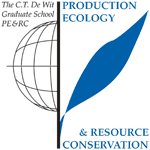Multivariate Analysis
You are here

Multivariate Analysis
to be announced
Scope
The multidimensional data on community composition, properties of individual populations, or properties of environment are the bread and butter of an ecologist’s life. They need to be analysed with taking their multidimensionality into account. A reductionist approach of looking at the properties of each variable separately does not work in most cases. The methods for statistical analysis of such data sets fit under the umbrella of ‘multivariate statistical methods’. In this course, our intention is to provide the participant with both the basic understanding of principles of multivariate methods and the skills needed to use those methods in his/her own work.
Programme
- Day 1: Collecting data, multiple linear regression and polynomials, qualitative variables in regression, selection of variables, comparing models.
- Day 2: Loglinear models, analysis of presence-absence data, logistic regression analyses with the Gaussian response model.
- Day 3: Introduction to multivariate analysis, ordination, direct and indirect analysis of gradients, length of gradient, principal components analysis (PCA), redundancy analysis (RDA), interpretation biplots of PCA and RDA.
- Day 4: Ordination based on correspondence analysis methods (CA, CCA and DCA) Interpretation CA/DCA plots, choice of method.
- Day 5: Cluster analysis, choice of similarity measure, agglomerative methods, divisive methods, classification and interpretation.
General information
| Target Group | The course is aimed at PhD candidates, postdocs, and other academics that are working above plant integration level in plant, animal, and/or environmental/ecological sciences |
| Group Size | Min. 15 / Max. 24 participants |
| Course duration | 5 days |
| Language of instruction | English |
| Frequency of recurrence | Annually |
| Number of credits | 1.5 ECTS |
| Lecturers | Ir. Saskia Burgers (Wageningen UR) and dr. Jos Hageman (Biometris, Wageningen UR) |
| Prior knowledge | Participants are expected to have a good knowledge of basic statistics (like hypothesis testing, t- and F-tests and linear regression) and some experience in a statistical package (GenStat, R, SPSS, or likewise) |
| Location | Wageningen University Campus |
| Accommodation | Accommodation is not included in the fee of the course, but there are several possibilities in Wageningen. For non-WUR PE&RC members 50% of the accommodation costs can be reimbursed with a maximum of €30,- per night. For information on B&B's and hotels in Wageningen please visit proefwageningen.nl. Another option is Short Stay Wageningen. Furthermore Airbnb offers several rooms in the area. Finally, there are a number of groups on Facebook where students announce subrent possibilities and things like that. Examples include: Wageningen Room Subrent, Wageningen Room Sublets, Room Rent Wageningen, and Wageningen Student Plaza. Note that besides the restaurants in Wageningen, there are also options to have dinner on Wageningen Campus. |
More information
Claudius van de Vijver (PE&RC)
Phone: +31 (0) 317 485116
Email: claudius.vandevijver@wur.nl
Registration of interest
At this moment, this course is not scheduled yet. However, if you register your interest in this activity below, we will inform you as soon as the course is scheduled and registration of participation is opened.
